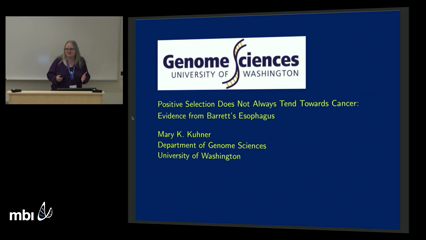MBI Videos
Mary Kuhner
-
 Mary KuhnerBarrett's Esophagus is a neoplastic condition that usually remains stable, but progresses to esophageal adenocarcinoma (EA) in approximately 5% of cases. We used WGS to survey 4 biopsies from 40 EA-outcome and 40 non-EA-outcome Barrett's patients.  These data showed two strongly contrasting patterns. A constellation of genomic-damage indicators including mutations in TP53, copy-number changes, genome doubling, and chromosomal rearrangements were strongly associated with progression to cancer. However, a separate set of features including very high point mutation and indel loads, mutation signature 17, copy-number variation at fragile sites, and positive selection on multiple loci were observed across patients regardless of outcome and showed little to no association with progression. While features in this second group are advantageous in the hostile environment of the Barrett's segment, they are not sufficient for development of EA. These findings show the critical importance of contrasting cancer and non-cancer outcomes, as otherwise selectively favored traits in pre-cancer tissues will be mistaken for drivers of progression.
Mary KuhnerBarrett's Esophagus is a neoplastic condition that usually remains stable, but progresses to esophageal adenocarcinoma (EA) in approximately 5% of cases. We used WGS to survey 4 biopsies from 40 EA-outcome and 40 non-EA-outcome Barrett's patients.  These data showed two strongly contrasting patterns. A constellation of genomic-damage indicators including mutations in TP53, copy-number changes, genome doubling, and chromosomal rearrangements were strongly associated with progression to cancer. However, a separate set of features including very high point mutation and indel loads, mutation signature 17, copy-number variation at fragile sites, and positive selection on multiple loci were observed across patients regardless of outcome and showed little to no association with progression. While features in this second group are advantageous in the hostile environment of the Barrett's segment, they are not sufficient for development of EA. These findings show the critical importance of contrasting cancer and non-cancer outcomes, as otherwise selectively favored traits in pre-cancer tissues will be mistaken for drivers of progression.
